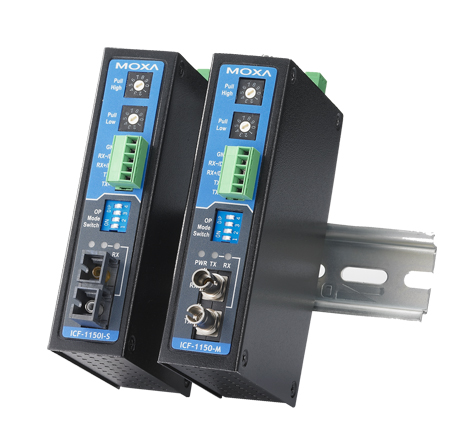Description
Includes
- 1 x ICF-1150 Series unit
- 1 x installation guide
- 1 x warranty statement
Specs:
Fiber Connector
SC or ST
Wavelength
ICF-1150-S (single-mode) 1310 nm
ICF-1150-M (multi-mode) 850 nm
Tx Output
ICF-1150-S (single-mode) > -5 dBm
ICF-1150-M (multi-mode) > -5 dBm
Rx Sensitivity
ICF-1150-S (single-mode) -25 dBm
ICF-1150-M (multi-mode) -20 dBm
RS-232 Signals
TxD, RxD, SGND
RS-422 Signals
TxD+, TxD-, RxD+, RxD-, SGND
RS-485-4w Signals
TxD+, TxD-, RxD+, RxD-, SGND
RS-485-2w Signals
Data+, Data-, SGND
Baudrate
50 bps to 921.6 Kbps
ESD Protection
15 KV for all signals
Isolation
2 KV RMS isolation per I/O port for 1 minute
Operating Temperature
Standard Models 0 to 60°C (32 to 140°F)
Wide Temp. Models -40 to 85°C (-40 to 185°F)
Input Voltage
12 to 48 VDC
Power Consumption
ICF-1150 127 mA @ 12 V
ICF-1150I 163 mA @ 12 V
Overview:
The ICF-1150 series support 2 serial ports, with a D-sub connector for RS-232 communication and a removable terminal block for RS-422 or RS-485 communication. The 3 ports (2 serial ports and one fiber port) are completely independent.
When an ICF-1150 converter receives data from any one port, it will send the data out through the other 2 ports. For example, once the ICF-1150 converter receives a command from the remote master through the fiber port, it will convert the signal and send the command through the RS-232 and RS-422/485 ports at the same time. If the user is monitoring a system running on an RS-485 network, there is no need to use an additional RS-232 to RS-485 converter to connect the laptop computer’s serial port to the RS-485 bus.







Reviews
There are no reviews yet.